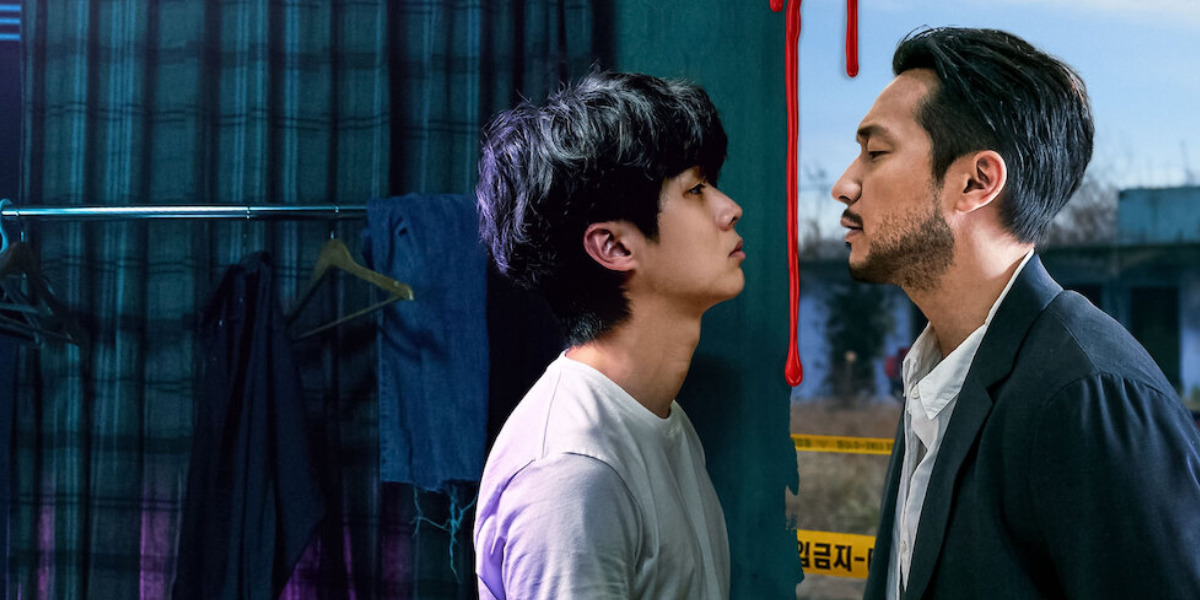The Netflix comedy-crime K-Drama, ‘A Killer Paradox,’ brings a thrilling tale that examines the nuances of morality through an intriguing protagonist. At first glance, Lee Tang is a regular college student with a regular part-time job to support himself. However, the boy finds himself going down a dangerous path when he unintentionally kills a man, only to find out the latter is a wanted serial killer. As a result, Lee Tang realizes he has the supernatural ability to single out evil people and begins using his eclectic powers to hunt down wicked individuals. Yet, his murderous streak soon catches law enforcement’s attention in good ways and bad.
Despite the central character’s outlandish abilities, the show charts a realistic criminal tale with Tang’s inexplicable powers becoming a tool to explore psychological themes of morality and personal responsibility. Furthermore, through Detective Jang Nan-Gam’s secondary character, the show presents a hilarious dynamic while adding further criminal realism to the story. Therefore, viewers must be wondering about the nature of the show’s origins.
A Faithful Adaptation of the Eponymous Webtoon
Given the story’s premise, which revolves around a subtle fantastical element, ‘A Killer Paradox’ decidedly stays within a realm of fictionality. Still, instead of having a basis in reality, the show is an on-screen adaptation of a popular eponymous webtoon by Kkomabi. The webtoon depicts a similar tale about a college student who acquires strange powers overnight that compel him to embark on a murder spree.

However, the morality behind the protagonist, Lee Tang’s grotesque murders remains debatable since his victims only consist of a string of wrong-doers who arguably deserved their fates. Furthermore, the same supernatural phenomenon seems to protect Tang from the cops, hiding traces of evidence that may be used to track him. As a result, Tang spirals into an introspective journey wherein he must find a way to put his newfound abilities to good use while also maintaining a handle on his morality.
As such, the same elements of the story that depart it from reality end up informing the narrative’s sense of relatability in significant ways. The webtoon deals with heavy themes of self-actualization and the repercussions of murder through a realistic portrayal of a young adult’s guilt revolving around a virtuous dilemma.
In fact, the webtoon’s authentic approach to such a sensitive and complicated topic is what attracted lead actor Choi Woo-sik, best known for his roles in beloved Korean movies such as ‘Parasite’ and ‘Train to Busan.’ Woo-sik spoke about his involvement in the show at a press conference and expressed his appreciation for the source material as well as the complexities of his character, Lee Tang.
“He [Tang] is a character who was living a truly ordinary life as a college student. He starts committing murders accidentally due to a certain event. After that incident, he gradually realizes that he has the ability to discern villains. Initially, committing murders is not something he does he wants to,” said Woo-sik at the press conference. “As the character grows, there is internal growth as he begins to search for villains himself. I think a lot of focus was placed on that aspect.”
Therefore, the show, adapted by Director Chang-hee Lee, sports its authenticity to the source material as its most compelling tool in the arsenal. The existing webtoon already brings such realism and authenticity to its characters and storylines that by remaining faithful to its narrative, the show ensures an equally genuine depiction. Furthermore, due to the story’s pre-existing fanbase, the decision to maintain accuracy to the webtoon’s canon helps the show ensure it appeals to its target audience.
Ultimately, ‘A Killer Paradox’ provides a good blend of harmonious genres by incorporating themes of detective noir, comedy, and moral quandary into one neat package. However, the significant sprinkle of supernatural elements confines the show into a fictitious narrative. Thus, with a basis in an eponymous webtoon, the show remains a work of fiction.
Read More: Best KDramas on Amazon Prime


You must be logged in to post a comment.